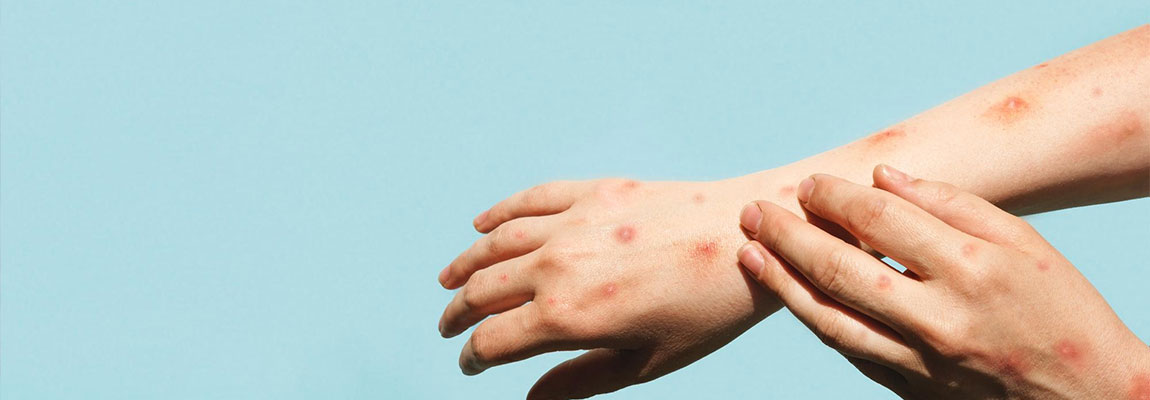
Herpes skin disease, also known as herpes skin rash or herpes simplex virus (HSV), is a common viral infection that affects millions of people worldwide. Herpes skin disease is caused by the herpes simplex virus (HSV), which belongs to the same family of viruses responsible for cold sores and genital herpes.
There are two types of herpes simplex virus (HSV) that cause herpes. Although these types are closely related and both spread through bodily fluids and human contact, they transmit in different ways.
The virus can spread even when it’s not causing any symptoms.
- HSV-1, known as oral herpes, is often contracted during childhood. It can spread through skin-to-skin contact, kissing, and sharing items like lip balm, tableware, or toothbrushes.
- HSV-2, or genital herpes, usually spreads through sexual contact. However, HSV-1 can also cause genital herpes and can spread through saliva during oral sex. HSV-2 can also be transmitted to a baby during childbirth.
Both forms of the virus enter the body’s nerve cells, where they remain for life. The virus stays dormant until something triggers it, leading to an outbreak of symptoms.
Factors that can trigger an outbreak include emotional stress, illness, fever, sun exposure, menstruation, and surgery.
Symptoms of herpes skin disease may include tingling, itching, or burning sensations followed by the appearance of small, fluid-filled blisters or sores. These blisters can be painful and may crust over as they heal.
Who is at Risk of Getting Herpes Skin Disease?
Anyone can get HSV, no matter how old they are. If you come into contact with HSV, you’re likely to get it. Keep in mind, that HSV is very common. But because it often doesn’t show symptoms, many people with the virus never know they have it.
You might have a higher chance of getting the virus if:
- You have a sexual partner who has HSV.
- You were assigned female at birth (AFAB). Some evidence suggests that more AFAB people than those assigned male at birth develop HSV, but this could also mean AFAB people are more likely to have symptoms.
- Your immune system isn’t working well (called immunocompromised).
Some older research suggests that having HSV-1 antibodies might give some protection against getting HSV-2 for AFAB people. However, many people who have one type of the virus end up getting another type later on. Once you have one type of virus, you won’t get the same type again because it stays inactive in your body.
You might have a slightly higher chance of getting genital HSV if you have sex without using condoms or other barrier methods. But keep in mind that condoms and other barrier methods might not cover all the places where the infection can show up, like on the buttocks or inner thighs.
How Do Doctors Diagnose Herpes Skin Disease?
Doctors can often diagnose herpes skin disease by looking at the blisters. They might also ask about other symptoms, like feeling sick or having a tingling sensation.
To confirm the diagnosis, they might do a culture. This involves taking a sample from the sore and sending it to a lab for testing.
If you think you might have been exposed to herpes skin disease but don’t have symptoms, a blood test can check for HSV antibodies. But remember, blood tests might not detect HSV accurately until about 12 weeks after you get infected.
Regular STI tests usually don’t include herpes testing, so it’s a good idea to ask your doctor about it if you’re worried you might have the virus.
You can also use a home testing kit to check for HSV antibodies yourself.
What is the Treatment of Herpes Skin Disease?
Unfortunately, there’s no cure for herpes at the moment, but the good news is that the sores caused by herpes often go away by themselves.
There are treatments available that can help make the outbreak shorter and reduce the discomfort of symptoms. These treatments include antiviral medications, which can be in the form of creams, ointments, or pills.
For those who experience frequent outbreaks, doctors may recommend taking antiviral medication daily as a preventive measure. This is known as prophylaxis and can help reduce the frequency and severity of outbreaks.
Common antiviral medications used to treat herpes outbreaks include acyclovir, famciclovir, and valacyclovir. These medications work by preventing the virus from multiplying and spreading in the body, which can help speed up the healing process and alleviate symptoms.
Antiviral creams or ointments can be applied directly to the affected area to relieve symptoms like burning, itching, or tingling. Antiviral pills are taken orally and are often more effective at treating severe or recurrent outbreaks.
The Bottom Line
For most healthy people, a herpes skin disease isn’t usually a big deal, except for the risk of spreading it to others. The sores might be painful and uncomfortable, but they usually go away on their own. You can get medicines to help with the symptoms at the drugstore or from your doctor. However, for some people, the virus can cause more serious problems. If you have a long-term health issue or a weak immune system and you think you might have herpes, it’s important to talk to your doctor.
People with conditions like cancer, HIV, or AIDS and those who’ve had an organ transplant should see a doctor right away if they think they might have herpes. It’s crucial to address any concerns promptly, especially for individuals undergoing regular skin cancer screening, to ensure accurate diagnosis and appropriate treatment. If you’re not sure if it’s herpes causing your rash or something else like dermatitis, shingles, or scabies, you can talk to your doctor to get a proper diagnosis.